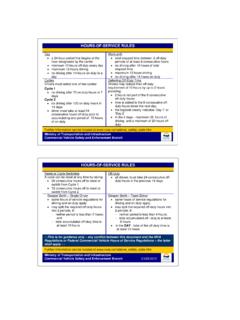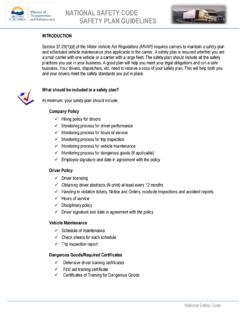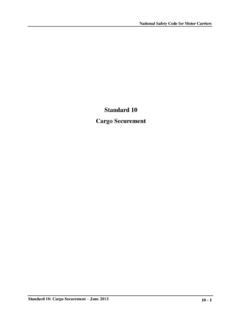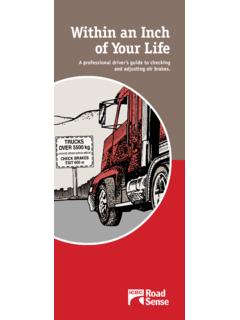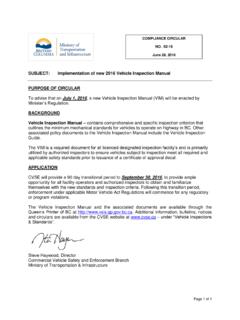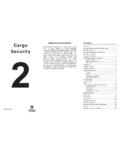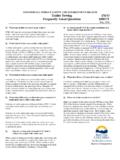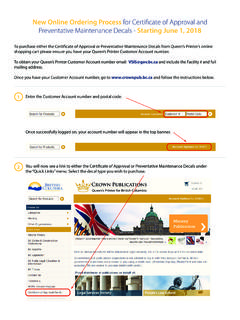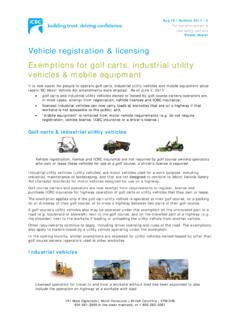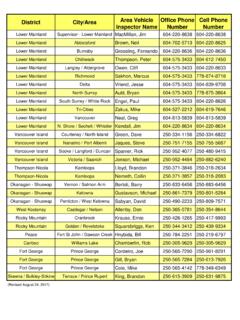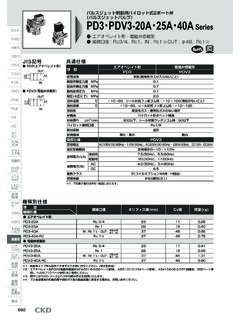Transcription of Gross Vehicle Weight Rating - CVSE - Home
1 CVSE2020 Gross Vehicle Weight Rating Frequently Asked Questions Q. What is the Gross Vehicle Weight Rating ? The GVWR refers to the maximum Weight a Vehicle is designed to carry including the net Weight of the Vehicle with accessories, plus the Weight of passengers, fuel, and cargo. The GVWR is a safety standard used to prevent overloading. Q. Who determines the GVWR? Vehicle manufacturers set the GVWR based on requirements set by Transport Canada. Q. How is the GVWR determined? The manufacturer determines the maximum acceptable Weight limits by considering the combined Weight of the strongest Weight bearing components (the axles) and the weaker components ( Vehicle body, frame, suspension and tires). Q. What are the penalties for driving a Vehicle loaded above its GVWR? Regulations in BC were recently changed to address consumer and industry concerns about the GVWR. If a Vehicle , with a GVWR of 5,500 kilograms (kgs), or less, that is manufactured before January 1, 2001 is loaded in excess of its GVWR and enforcement officer deems it to be unsafe, the driver of that Vehicle may be given a Notice and Order.
2 Most light trucks and RVs have a GVWR of less than 5,500 kgs. If a Vehicle with a GVWR of more than 5,500 kgs, regardless of the date it is manufactured, is loaded in excess of its GVWR, the driver of that Vehicle may be given a violation ticket. Driving a Vehicle loaded above its GVWR creates a potential safety hazard because the Vehicle s frame, suspension, brakes and tires are not designed for weights above the Rating the manufacturer has set. Q What will be the penalty for driving an overloaded Vehicle that has a GVWR of 5,500 kgs, or less, if that Vehicle is manufactured after January 1, 2001? The driver of any Vehicle manufactured after January 1, 2001, which is loaded above its GVWR, may receive a violation ticket. The GVWR is the standard for determining if a Vehicle is overweight. A change to the regulations affects the drivers of vehicles that have a GVWR of 5,500 kgs, or less, and are manufactured before January 1, 2001. This change was made to allow owners of the exempted vehicles time to upgrade, if needed, to vehicles that are better suited to their load-carrying needs.
3 The change will also give Vehicle dealers time to ensure consumers are advised about the GVWR and its implications when purchasing a Vehicle . Q. What is the difference between a violation ticket and a Notice and Order? If you receive a violation ticket, you must pay a fine. If you receive a Notice and Order, you are asked to bring your Vehicle into compliance within a specified time. Or, if the Vehicle is obviously unsafe, it may be ordered off the road until the defect(s) or situation is corrected. Q. How does a Peace/Police Officer decide if a Vehicle is unsafe? Peace/Police Officers will use visual cues to determine if a Vehicle is obviously overloaded. These cues include vehicles: that look unstable when moving that have a front end higher than the back end (the Vehicle is not level) with tires that appear deflated Q. How can I find out if my Vehicle is overweight or unsafe? The easiest way to know your Vehicle is safe is to ensure you do not exceed the GVWR. You can also use the same visual signs used by Peace/ Police Officers to determine if your Vehicle is unsafely loaded.
4 The best way to find out how much Weight your Vehicle can carry is to subtract the net Weight of the Vehicle from the GVWR (located on the driver s door post). The number remaining is the maximum Weight your Vehicle can carry. If you cannot locate the net Weight of your Vehicle in your owner s manual or if you have added accessories that increase the net Weight , you can have your unloaded Vehicle weighed at a weigh scale. Q. What is the difference between the licensed Weight (GVW) shown on my Owner s Certificate (insurance papers) and the GVWR on the Vehicle itself? When you license a Vehicle , you pay a basic road licensing fee based on the Weight you plan to CVSE2020 carry and tow. You may increase the amount you are licensed to carry by paying a higher fee; however, this does not mean the Vehicle will be able to carry more Weight . Vehicles cannot exceed the manufacturers GVWR. Since heavier vehicles cause more damage to the infrastructure of our roads, the owners of these vehicles are required to pay higher licensing fees to offset the cost of maintaining roads.
5 You may notice that the licensed GVW on your insurance papers is higher than your Vehicle s GVWR. This occurs because the licensed Weight (GVW) includes both the load you carry on, or in, your Vehicle and the load you are towing. GVW refers to the Weight you are licensed to carry and tow. GVWR refers to the Weight your Vehicle is designed to carry. Q. How much can my Vehicle tow? Check your owner s manual to find your Vehicle s towing capability. If you tow a load that is too heavy for your Vehicle , you create a potential safety risk for yourself and others on the road. You may also damage your Vehicle . It is important that you be able to stop both your Vehicle and your trailer. Braking requirements for all trailers are regulated and enforced. You may receive a violation ticket if you carry more Weight than you are licensed to carry. Q. If I am towing a trailer (or other Vehicle ), is the Weight of the trailer considered to be part of the load of the towing Vehicle ? No, the Weight being towed is not part of the load of the towing Vehicle ; therefore, you do not need to include it in your calculations.
6 You do, ever, need to include the Weight your trailer will put on the trailer hitch or 5th wheel. The Weight on the hitch (known as the tongue Weight ) is part of the load of the towing Vehicle . Q. What about the Weight of the load in my trailer? Does that count as part of the GVWR of the Vehicle towing the trailer? Each utility trailer, recreational trailer, horse trailer and other towed Vehicle usually has its own GVWR set by the manufacturer. The Weight of the load in, or on, the trailer is not part of the load of the towing Vehicle . The Weight the trailer puts on the hitch of the towing Vehicle is part of the towing Vehicle s load. Q. I have a U-build utility trailer that does not have a GVWR. How much can I carry in that trailer? If there is no GVWR indicated on the utility trailer, it will be licensed to carry 1401 kgs GVW, the average capacity of utility trailers. If you are uncertain about how much Weight your Ubuilt utility trailer can carry, you can have a BC certified engineer assess each component and assign the Vehicle a GVWR.
7 Check the Yellow Pages for the location of a certified engineer near you. Q. Where can I get more information about the GVWR? You can speak the local Weigh Scale. Information is also available at our website at: Information on this Info sheet is subject to change without notice. In the event of conflict with this Info Sheet and the Motor Vehicle Act and Regulations, the Acts and Regulations shall apply.
